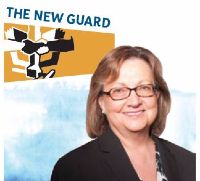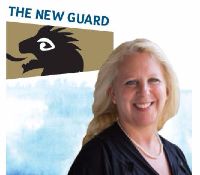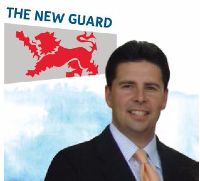To answer these and other questions, we reached out 12 relative newcomers to independent school leadership positions. Note that this article is part of a series from the January/February 2017 Net Assets. See the other articles:
- The Next Generation of Leadership: Masters of Reinvention
- Filling the Leadership Pipeline
- Money Matters for Next-Generation Leaders

Rochelle Hargraves
St. Patrick’s Episcopal Day School
Washington, D.C.
Job title and start: Assistant head of school for finance and operations, July 2016
Previously: Six years as CFO at the YWCA of the National Capital Area, preceded by nine years in finance and operations at other nonprofits.
Surprised by: “The genuine desire to collaborate within the school and wider community. Idea sharing is valued, and feedback comes from a place of authentic interest for the well-being of the community at St. Patrick’s and for me as a professional.”
Advice for schools anticipating a leadership change: “Develop a thorough succession plan well in advance of the leader's departure. Not only does the process prepare the school for unforeseen changes, but it also brings to light any gaps in knowledge and skills, and highlights the need to compensate for those. More importantly, it can serve as an onboarding tool for the incoming leader and help transfer some of the institutional knowledge that otherwise would have been lost. Second, when the time comes to fill that leadership role, commit to casting a wider net. If the cultural fit exists and the technical competence is evident, be open to hiring a leader that does not have independent school professional experience. Finally, send your new leader to the NBOA Business Officer Institute [offered every June] as part of their onboarding. I found this to be an incredibly valuable training opportunity. It laid a foundation of not only field-specific knowledge but also opened the doors to a professional support system.”

Andrea Sabitsana
Greenwich Academy
Greenwich, Connecticut
Job title and start: Chief financial officer, August 2016
Previously: Higher education finance with responsibilities including accounting, budgeting, financial reporting and taxes.
Attraction factor: “Being the product of an all-girls education and the mother of three young girls, Greenwich Academy's mission Toward the Building of Character really appealed to me. I was excited to be part of a smaller environment in an independent school and was impressed by the culture of innovation and continuous improvement.”
Surprised by: “Despite the high expectations that come with an independent school, the culture is extremely warm and inviting. I was also impressed with the level of engagement of the trustees, current parents, faculty and staff striving towards the common goal of ‘What is best for our girls?’”

Gail Schulman
Gann Academy
Waltham, Massachusetts
Job title and start: Chief operating officer, May 2016
Previously: COO in a global high-tech company.
Attraction factor: “I wanted to apply my business skills in an environment in which I felt I could truly give back, and in an organization whose mission inspired me.”
Surprised by: “You can call it a CFO job, but it is so much more than finance — it encompasses everything from rethinking our physical spaces and ensuring support for our technology to making sure the buses run on time and advising students in the business club.” Also: “the hands-on nature of running a very small business office compared to a well-resourced business in the corporate environment; the complexity of an environment where our ‘customers’ are also our donors and our volunteers; how inspiring it is to work with leadership, colleagues and staff who are committed to the school’s mission and who use their creativity to advance that mission.”

C. Bear Paul
National Presbyterian School
Washington, D.C.
Job title and start: Chief financial officer, July 2016
Previously: Business manager at a charter school. Has also been a classroom teacher, assistant director of a middle school, coach and occasional bus driver.
Attraction factor: “My wife attended NPS and still tells stories of how warm a community it was. On my visit in the spring, I was delighted to find that the school remained the wonderful place she described. The board of trustees, faculty, staff and parents are engaged and committed to maintaining a remarkably warm and caring school environment.”
Surprised by: “How much I love working in an elementary school. My previous school professional experience has all been at the middle school and high school levels. This is my first time working in an exclusively elementary school. I feel lucky to be here.”

Melanie Johnson
Lick-Wilmerding High School
San Francisco
Job title and start: Chief financial officer,
July 2015
Previously: CFO at a community-based nonprofit providing housing and services to very low-income and homeless individuals and families. Finance and operations work in not-for-profit and for-profit organizations.
Attraction factor: “The school’s commitment to teaching students to participate in and contribute to the broader community.”
Surprised by: “Just how much can be packed into a day at Lick-Wilmerding, as the school is bursting with an impressive array of collaborative, inspirational, artistic, philanthropic and fun learning opportunities throughout the year.”

Ann Visalli
St. Andrew’s School
Middletown, Delaware
Job title and start: Chief operating officer, May 2016
Previously: Director of the office of management and budget for the state of Delaware.
Surprised by: “How welcoming and supportive the entire school community
has been.”
Advice for schools anticipating a leadership change: “Communicate with everyone about how positive the experience can be. Support new leaders by sharing experiences from others who have transitioned into the school recently as well as from those who can share the long and rich history of the school and its culture. Both perspectives are incredibly important.”

Linda MacLean
Marist School
Atlanta
Job title and start: Vice president, finance, February 2015
Previously: 20 years in leadership positions at UPS. Began in public accounting at a (then) “Big Eight” firm.
Attraction factor: “My three children graduated from Marist and I was on the Marist board of trustees. It has been an important part of my family’s life, and I wanted to contribute in some way.”
Surprised by: “The variety of issues that have come across my desk, large and small. I am also learning a lot of interesting and thought-provoking things from students and faculty that I hadn’t been exposed to before.”

Ann-Marie Flynn
Shore Country Day School
Beverly, Massachusetts
Job title and start: Director of finance and operations, July 2016
Previously: Positions in financial aid, admissions and student employment at a private college; also accounting and management in food service, building management and transportation companies.
Surprised by: “Each day is a new and exciting challenge.”
Advice for schools anticipating a leadership change: “Help cultivate a relationship between the current leader and successor. Have the current leader thinking about the transition a year in advance if possible, and make notes on cyclical forms and spreadsheets. Provide quick and easy access to a staffing directory with names and faces. A calendar of events and who ‘owns’ those events is helpful to compare past with present and helps to ensure nothing falls through the cracks. Only new items need to be updated for the current year.”

Jeff Cataldo
Kent School
Kent, Connecticut
Job title and start: Business manager and chief financial officer, 2012 (controller 2008-2012)
Attraction factor: “I was managing acquisitions for a large multinational company and was interested in being part of a smaller organization. My first reaction: why would I work for a not-for-profit when my entire career has been about maximizing profit? There was something about working for a school that I found interesting. I learned quickly that the world of independent school finance is fascinating and requires many of the skills learned in the for-profit setting.”
Surprised by: “How broad the responsibility of an independent school CFO is.”
Advice for schools anticipating a leadership change: “Do not lose sight of the school’s mission. Remove the noise and confusion that exist in every organization, and focus on priority issues that will create value through program involvement. Independent school CFOs must realize that they are part of the operating team responsible for executing the strategy to improve the school; they must go beyond the management of traditional financial issues and remain committed to creating ‘real value’ for the school.”

Virginia Arbour
Emma Willard School
Troy, New York
Job title and start: Chief financial officer, August 2016
Previously: 35 years in administration and finance, primarily in nonprofit hospice and palliative care organizations.
Attraction factor: “Having worked as a trustee of a college, I had become increasingly interested in education, especially advancement of young women. I wanted to be a part of empowering young women to be the great leaders of the future.”
Surprised by: “The overlap between health care and education, with both sectors aligning risk with strategy in order to accomplish the mission.”
Advice for schools anticipating a leadership change: “Look for leaders with good skills in communication, collaboration and ability to manage change. A good sense of humor wouldn’t hurt. Leaders of the future need to be able to embrace and lead in change management while respecting the past, the culture and organizational strengths. Properly train, document and coordinate good succession planning for key roles.”

John Cunningham
Job title and start: Director of finance and operations, June 2014
Previously: Financial officer at a liberal arts college.
Attraction factor: “My children attended St. Martin’s and I was previously a member of the board of trustees. The position intrigued me. I liked the school’s mission and employees. I thought this could be a place where I could grow professionally and utilize my prior experience to benefit the school.”
Surprised by: “The intensity and scope of the position. It requires skills that are both deep and wide.”
Advice for schools anticipating a leadership change: “Plan ahead and look for a person who has the skills and ability to fit into the school’s culture.”

Justin Wheeler
Delaware Valley Friends School
Paoli, Pennsylvania
Job title and start: Chief financial officer, March 2016
Previously: Nine years as a CFO in the charter school sector. Taught English at two independent schools.
Attraction factor: “The Quaker belief system and how it plays out in education. I was interested in a school serving students with learning differences in a robust way.
I was looking to return to working in a single school, close to program.”
Surprised by: “I expected that the pace of organizational change would be slower than in the charter school sector. In fact, we've made significant changes at DV. We're in a very competitive and dynamic market, so we've got to be collecting quality data, doing quality analytics on that data, and constantly responding to what we learn. I'd go further and say that we need to generate more opportunities to learn about our market by piloting innovations and rigorously evaluating their results. I'm excited to be working with a head of school and leadership team that share that approach.”
Advice for schools anticipating a leadership change: “There are benefits to bringing in school business leaders with experience in strategic roles in other sectors. There are also of course risks — especially that there won't be a culture fit. The charter sector grows up leaders more quickly than independent schools and, at least among the larger networks, benefits from the influence of business thinking from the tech, management consulting and finance worlds. It may be an emerging source of business and operations talent for independent schools.”
Download a PDF of the article.


